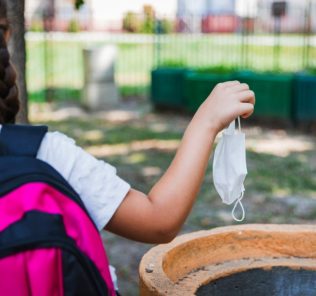Children’s Reading levels are not where they should be after the pandemic – and parents are key to solving the problem. Here’s what you can do to plug the learning gap over the summer vacation
Across the world there is evidence that children’s reading levels have been significantly impacted by the disruption caused by the pandemic. The reading crisis that was already happening before Covid has been exacerbated by prolonged lockdowns across the world, with one UK study finding that 68% of children who had been in FS2 when the pandemic hit in 2019/2020 were not reading at the expected level for their age by the end of Year One in 2021.
It’s equally bad in the US, where a large-scale study of 400,000 Elementary School students found big holes in children’s fundamental reading skills, with more than 1 in 3 pupils not meeting expected reading milestones for their age – a trend that gets worse the younger the child is, and improves slightly from 5th grade upwards.
While the UAE returned to school much more swiftly than many other parts of the world, and the online education provision was generally of a very high quality, children have still not emerged totally unscathed by the disruption. Teachers in Dubai have told SchoolsCompared they’ve noticed that across the board – but especially in younger students – children’s reading levels were not where they might usually be, and several schools have tackled the problem head-on with dedicated, intensive programmes to bring children up to speed.
Emma Monteith, Head of English, GEMS FirstPoint School – The Villa (FPS) says:
“We have noticed that the pandemic has magnified students’ aptitude in reading. Those who were reluctant readers or those who are learning English as an additional language have been negatively impacted by the disruption to learning time during the pandemic. That said, we have some very avid and enthusiastic readers, and the pandemic has afforded those students more time to devote to their reading.”
The impact of struggling to read on a child’s education and wellbeing cannot be underestimated, says Martin Cole, Deputy Headteacher at Horizon English School, and education providers need to tackle any issues head-on:
“Learning to read should not be left to chance; a child’s reading confidence is highly likely to impact on attainment in all curriculum areas, their self-esteem and their enjoyment of school as a whole. As a result, the effective, rigorous teaching of reading is essential for all students and there is both an Art and a Science to teaching reading.”
Schools taking the lead
Both Horizon English and GEMS FirstPoint School have a cornucopia of literacy programmes and technology to help students, which have been put to good use in tackling any reading issues that have emerged in the wake of the pandemic. Emma Monteith, Head of English, GEMS FirstPoint School – The Villa (FPS) says:
“We have strong and established programmes of in-class reading support like Reciprocal Reading, as well as investment in specific reading EdTech programmes like Renaissance Accelerated Reader and Common Lit, which enable our teachers to deliver bespoke reading-age improvements at all levels.”
For GEMS FPS – which is an all-through school teaching students up to the age of 18 – reading improvement doesn’t end at Primary level:
“We are committed to ensuring children at all levels are stretched to develop their reading skills, and so through our Key Stage 5 programmes we offer specific university-level reading materials to support students in securing critical reading competence that will support them beyond life at FPS.”
And for non-native English speakers who have challenges reading in English, there is tailored support:
“Additionally, we have a specific ESL department with specialist staff who deliver lessons that expertly support students who are new to English. We use programmes like Lexia, which has supported the literacy basics of our ESL students.”
But it’s not only about the technology, says Martin Cole from Horizon English School. Especially for younger children, sometimes the most effective technique is bringing it back to basics and making sure the lessons are fun:
“It is essential that children receive high quality systematic phonics teaching to develop their decoding. But instead of telling children the meaning of unfamiliar vocabulary, we teach them to be reading detectives, using a range of reading strategies to help them independently tackle unfamiliar language.”
“Furthermore, we know that reading lessons should be fun and consequently lessons are planned quite simply to do just that. Teachers deliberately model reading as an enjoyable process so that children want to do the same themselves.”
Why parents are the key to reading success
But while UAE schools are brimming with excellent phonics and literacy programmes, one thing that all educators agree on is that parental involvement is a crucial part of children learning to read.
Moneith of GEMS FirstPoint School – The Villa says:
“Parental involvement is vital. In fact, studies and research show that parental involvement is the most important determinant of emergent literacy in young children, and so equipping parents with this knowledge and research is important for us.”
There is a plethora of compelling studies that illustrate this. For example, every three years, the Programme for International Student Assessment (PISA) tests 15-year-olds in the world’s leading nations on their reading comprehension and other important skills. The oft-cited 2009 study made some fascinating discoveries that underlines the profound impact that parental involvement in reading from a young age can have on a child’s entire future.
It found that fifteen year-old students whose parents often read books with them during their first year of Primary school showed markedly higher scores almost a decade later at the age of 15 than students whose parents read with them infrequently or not at all; on average, the score difference was 25 points, which would be the equivalent of well over half a school year.
The study also discovered that reading transcends class and financial boundaries, with the performance advantage among students whose parents read to them in their early school years being evident regardless of the family’s socioeconomic background.
It’s important, therefore, for schools’ early reading programmes especially not only to be focused on learning within the school environment, but also on engaging and informing parents too – something that was put under the spotlight during the distance learning periods of the pandemic.
Horizon English School Deputy Headteacher Martin Cole says:
“Since the pandemic, we have made additional and deliberate actions to develop the quality of our students’ reading experiences at home.”
“Something that has been particularly successful since the pandemic has been inviting parents in to see their teacher or teaching assistant read 1 to 1 with their own child.”
“By seeing the approach taken in school, parents can then replicate certain elements of a session at home.”
“This also acts as a parent coaching session and provides an opportunity for parents to first watch a 1 to 1 reading session before asking questions about it.”
“Parents are also provided with an evidence-informed structure which they can then follow at home when reading with their child to make their reading experiences as beneficial as possible.”
Bridging the summer learning gap
Although the summer is a wonderful time to experience learning opportunities outside of the classroom, research has found that students tend to lose an average of one month’s school-learning over the extended vacation – something referred to as summer learning loss or summer setback, which means students start the new academic year with achievement levels that are lower than they were before the summer break.
One piece of good news for parents concerned about younger children’s reading is that studies show the decline in knowledge tends to be sharper in maths than in reading, and it tends to be worse in older children than younger ones.
However, for children whose reading is not yet fully established, or who experienced set-backs due to pandemic disruption, the two-month vacation could easily lead to further set-backs, and it is a valuable period of time during which to solidify learning and inculcate a love of reading for pleasure – a gift that will keep giving to children throughout their life.
GEMS FPS’s Montieth says:
“My advice for parents is to create positive conversations around reading at home over summer. Children absorb so much of their behaviour from adults, and if families can discuss books and reading at home this can be a huge motivator for children.”
“Making time to read with children and share bedtime stories can foster a love of reading that stays with children as they grow up.”
“For teens who may be more reluctant to read, celebrities like Sir Lenny Henry offer a clever tip for parents to turn on subtitles when children are watching TV – so they at least read by osmosis!”
Charlotte Grieves, Interim Principal, GEMS Royal Dubai School reminds parents that their role is not limited to just reading with your child:
“Be a role model for reading; we cannot expect our children to sit, read and enjoy books if we do not model the same behaviour as adults. Share the love of reading and make it a special time within your family.”
Why parents need to be taught how to read with their children
While it might seem self-evident how to read with your child, it’s an acquired skill, and some of your intuitive behaviours could actually be preventing your children’s learning from progressing as quickly as it otherwise would.
Martin Cole, Deputy Headteacher at Horizon English School, shares his tips:
“Whilst there is no definitive one-size-fits-all recommendation in terms of frequency for how often children should read or be read to at home, an approximate guide is to engage in reading 5 times per week for approximately 15-20 minutes.”
“One of the biggest pitfalls that adults can make when listening to a child read is to interrupt too frequently, therefore stripping the child of their independence and ultimately reducing the enjoyment of the reading experience. Instead, children should be given the opportunity to self-correct their own reading.”
6 Simple Ways to Make Home Reading Sessions Smooth and Effective
- Talk less
“Allow space and time for a child to decode and solve challenging words independently,” says Martin Cole, Deputy Headteacher of Horizon English School.
- Encourage their detective skills
If a child is struggling with a particular word, there are several strategies you can use before telling them the answer. If it is a long word you can suggest they try ‘Chunking’, which is when they use their finger to break up the word into its separate sounds. If they are pronouncing a sound in a way that is stopping them from decoding the word, suggest that they use their phonics knowledge to think about any alternative sounds a particular letter can make.
- Really, actually, listen
This might sound obvious but invest your time in focusing on your child when he or she reads, and build their confidence by allowing them to continue reading on even if they make a mistake. Once they finish the section or paragraph you can ask them to go back and look at the word again.
- Encourage independence
Let children hold the book themselves – as tempting as it is to have your child on your lap while you read together, it’s best for them to hold the book independently, and trace the words with their own fingers rather than with yours.
- Use Positive language
Martin Cole, Deputy Headteacher of Horizon English School says: “The language used when reading with children contributes significantly towards the quality of the reading experience.” Instead of just general praise, use specific positive feedback that refers to the effort they are putting into their reading. Horizon’s Cole says: “Phrases like: ‘I like the way you corrected that sentence on your own’ or ‘Well done for pausing for a full stop’ can help create a positive reading experience. - Aim for enjoyment
“Allowing time for children to enjoy their reading is important,” says Martin Cole. Looking at pictures or talking about their interpretation of their reading can be an engaging and important part of the process.” It’s always better to read a book that challenges children at the right level; reading books that are too hard for your child’s stage can undermine confidence. If a child is really struggling with a book, ask them to tell you a ‘picture story’ by looking at the images instead.”
Cole concludes:
“For children that lack confidence in reading, a good way to create an enjoyable reading experience is to read a familiar text that has been read before. This can enable greater independence and develop their reading self-esteem.”
© SchoolsCompared.com. 2022. All rights reserved.








































































Leave a Response